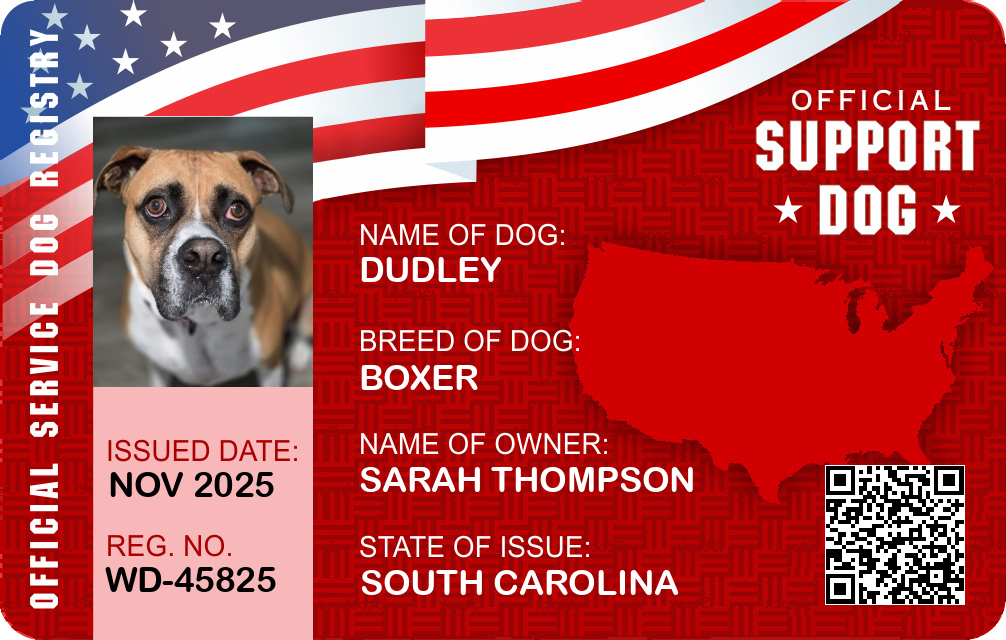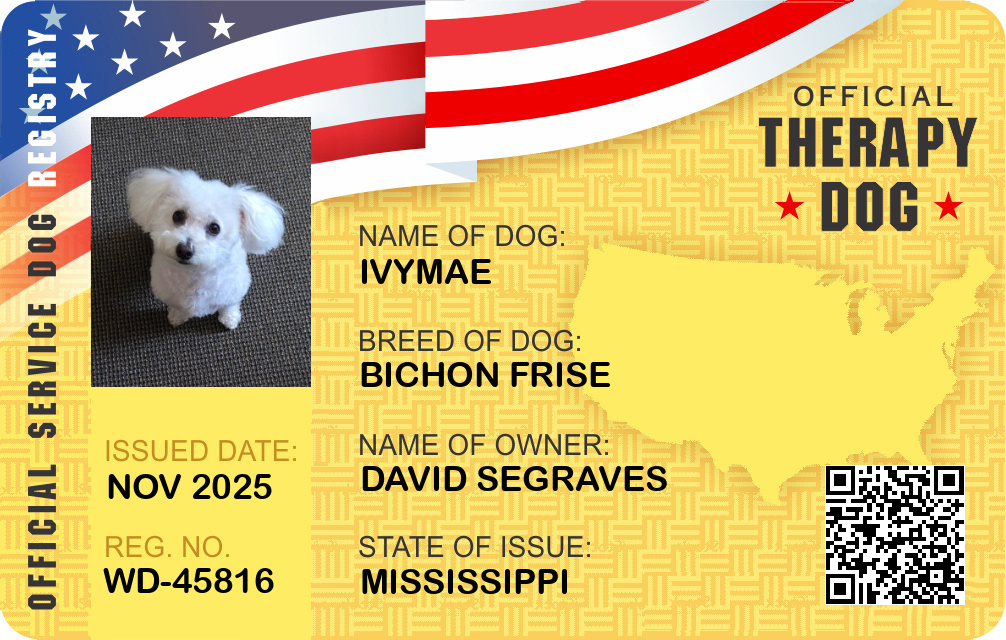Tennessee Emotional Support Animal Laws

Overview of ESAs and Legal Definitions in Tennessee
What is an Emotional Support Animal?
An Emotional Support Animal (ESA) is a companion animal that provides therapeutic benefits to individuals with psychological disorders or mental health conditions. Unlike service animals, ESAs do not require specialized training to perform specific tasks related to a disability. Instead, their primary role is to provide comfort and emotional support through their presence.
In Tennessee, as in the rest of the United States, ESAs are recognized under federal laws intended to support individuals who benefit from their companionship. These animals are an integral part of managing mental health challenges such as anxiety, depression, or PTSD (Post-Traumatic Stress Disorder).
How ESAs Differ from Service Animals
The primary distinction between ESAs and service animals is in the training and function of the animal. Service animals, which are often dogs, are trained to perform specific tasks directly related to a person's disability, such as guiding individuals with visual impairments, alerting individuals who are deaf, or pulling a wheelchair. In contrast, ESAs require no special training and are not limited to dogs or specific breeds. Any domesticated animal can potentially serve as an ESA, including cats, rabbits, and birds.
Because ESAs are not trained to perform tasks related to a physical disability, they are not afforded the same wide-ranging public access rights as service animals under the Americans with Disabilities Act (ADA).
Key Federal Laws Affecting ESAs (e.g., FHA, ACAA)
Several federal laws play a crucial role in defining the rights and responsibilities associated with ESAs:
- Fair Housing Act (FHA): This law prohibits discrimination in housing and requires landlords to accommodate individuals with ESAs, even in properties with no-pet policies. Under the FHA, landlords must make reasonable accommodations for ESA owners as long as the animal does not pose a direct threat to the safety and property of others.
- Air Carrier Access Act (ACAA): Until changes in regulation were implemented in December 2020, ESAs were allowed to accompany their owners in airline cabins free of charge. However, the Department of Transportation's rules now place ESAs within the category of pets, allowing airlines to establish their own ESA policies, typically requiring them to travel in a pet carrier in the cabin or as cargo.
These federal statutes create the groundwork, which Tennessee adheres to, ensuring that individuals with bona fide needs for ESAs are supported, particularly in areas like housing.
State-Specific ESA Laws in Tennessee
Housing Rights and Responsibilities
In Tennessee, housing laws align closely with the federal Fair Housing Act. This means that tenants with a verified need for an ESA are entitled to reasonable accommodations, even in properties with strict no-pet policies. Landlords must allow ESAs unless doing so would:
- Cause significant damage to the property.
- Pose an undue financial or administrative burden.
- Threaten the safety or well-being of other tenants.
For tenants, this means submitting proper documentation from a licensed mental health professional to establish the need for an ESA. It does not entitle the tenant to allow their animal to cause disturbances or damage.
Public Access and Accommodation
Unlike service animals, ESAs in Tennessee are not granted unlimited access to public places where pets are traditionally not allowed. The ADA, which grants access rights to service animals, does not extend these rights to ESAs.
Therefore, ESAs do not have legal access to:
- Restaurants
- Grocery stores
- Hotels
- Other public services or spaces with no-pet policies
Transportation and Travel Rules
With the shift in federal law due to the ACAA update, Tennessee transportation services generally view ESAs as pets. This means that ESAs must comply with standard pet policies of transportation services within the state, such as taxis, rideshares, and buses unless the service provider chooses to make special accommodations.
Employment and Workplace Considerations
Employers in Tennessee are not legally required to accommodate ESAs in the workplace under the ADA or Tennessee state laws. However, employees are still encouraged to have discussions with their employers regarding potential accommodations on a case-by-case basis, as some employers may voluntarily permit ESAs to support employee mental health.
Documentation, Requirements, and Register Your Dog Instantly
Processes in Tennessee
ESA Letters and Who Can Issue Them
To qualify for an ESA in Tennessee, individuals must have a letter from a licensed mental health professional. This professional can be a psychologist, psychiatrist, clinical social worker, or doctor familiar with the individual's mental health history.
The ESA letter should include:
- Confirmation of a diagnosed psychological or emotional disorder.
- The licensed professional’s opinion that the ESA would provide beneficial emotional support.
- The professional’s and/or practice's contact information and licensing details.
Registration, Certifications, and Common Misconceptions
There is no official registry or certification process mandated by federal or Tennessee law for ESAs. Websites offering "ESA certifications" or "registrations" often have no legal standing and can mislead individuals into believing that such documentation is required or recognized by law.
Owners only need the legitimate ESA letter from a licensed mental health professional.
Landlord, Business, and Provider Verification Rules
Landlords in Tennessee are entitled to request an ESA letter to verify the need for the animal. They can:
- Confirm the letter was issued by a licensed professional.
- Verify the individual’s need for the ESA.
- Deny requests if the ESA poses a health and safety risk or undue financial burden.
However, landlords cannot demand information concerning the nature of the individual's condition or demand fees or deposits specific to the ESA, although they can charge for damages caused by the animal.
Rights, Limitations, and Legal Risks
Rights ESA Owners Have in Tennessee
ESA owners have the right to request reasonable accommodations in housing, and fair treatment regardless of traditional pet policies. These rights are underpinned by the FHA, ensuring that individuals have access to the housing they need with their ESAs.
Limits on ESA Protections and Common Restrictions
Federal and state laws limit ESA protections strictly to housing. In other areas such as public access, transportation, and employment, ESA rights are more restricted compared to service animals, and owners must adhere to standard pet policies unless special accommodations are made.
Penalties for Fraud or Misrepresentation
Tennessee law shares the broader national concern of ESA fraud. Misrepresenting a pet as an ESA or service animal is a legal risk and can result in fines, mandated community service, or other penalties. Ethical representation is crucial in avoiding negative repercussions and ensuring the integrity and effectiveness of ESA laws.
Practical Guidance for ESA Owners in Tennessee
How to Qualify for an ESA Legitimately
The legitimate process for obtaining an ESA involves:
- Consulting with a licensed mental health professional.
- Acquiring a proper ESA letter outlining the necessity of the animal.
- Being informed of housing and any community-specific requirements applicable to their living situation.
How to Talk to Landlords, Airlines, and Employers
When discussing needs with landlords, airlines, and employers, ESA owners should:
- Present their ESA documentation calmly and professionally.
- Be prepared to explain their rights under the FHA.
- Negotiate any special considerations in good faith, understanding that not all requests can be accommodated.
Tips for Avoiding Scams and Legal Problems
To avoid scams and remain compliant with ESA regulations:
- Avoid online certificating or registration websites that claim to "legitimize" ESAs.
- Obtain ESA documentation only from verified, licensed mental health professionals.
- Be cautious of any request for fees specific to ESA possession, which may not be legitimate under the FHA.
Summary of ESA Laws in Tennessee
**
- ESAs differ legally from service animals and are primarily protected under the FHA for housing purposes.
- A licensed mental health professional must provide an ESA letter to validate an animal as an ESA.
- ESAs do not have public access rights akin to service animals and must follow standard pet policies in public spaces and transportation.
- While there are protections under the FHA, ethical and lawful representation of an ESA is crucial to avoiding legal issues.
- ESA owners should engage in open and clear communication with landlords and employers, providing legitimate documentation if required.
**











